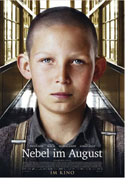

Opening 29 Sep 2016
Directed by:
Kai Wessel
Writing credits:
Holger Karsten Schmidt, Robert Domes
Principal actors:
Ivo Pietzcker, Sebastian Koch, Thomas Schubert, Fritzi Haberlandt, Henriette Confurius
Between 1939 and 1945 more than 200,000 patients were the victims of euthanasia in German psychiatric clinics. These patients suffered from various illnesses, had no economic value and were worthless re: contributions to the state or furthering Nazi goals. At least 5000 were children. This is the true story of Ernst Lossa (Pietzcker), from a Yenish gypsy family. Witnesses say that he did behave differently, but was also good at heart.
In Nebel im August we witness him, age 13, entering the Kaufbeuren Clinic in Bavaria, after the loss of his mother. Soon, he realizes that patients are being murdered, usually through starvation. He begins to smuggle food into hospital rooms. Dr. Walter Veithausen (Koch), the chief physician, comes across both as a “friend” playing with the children, as well as a cold-hearted manipulator who wishes to achieve expected clinical statistics and Hitler-decreed goals.
Director Wessel based the film on the book Nebel im August: Die Lebensgeschichte von Ernst Lossa by Robert Domes. It was published in 2008, after Domes spent five years researching the facts. A contributor to both book and film was Dr. Michael von Cranach, who was medical director of the hospital in Kaufbeuren 1980-2006. He researched the history of his clinic and found the Ernst Lossa file. Naturally, Kaufbeuren wasn’t the only clinic in Germany to allow euthanasia during the Nazi rule.
Young 12-year-old actor Ivo Pietzcker is brilliant in the role of Ernst; he alone is good reason to see the film. Also, many of the hundreds of extras who played patients were actually suffering from handicaps themselves, which makes the film true to life. History shows little post-war interest in punishment of clinic staff for their deeds; none of them landed in prison after the war. And, after watching the procedures in this Catholic environment, I wonder what role the church actually had. Fritzi Haberlandt is excellent as a Catholic nun. This film became a special landmark for me after I learned that the uncle of a close friend died under similar circumstances in the 1940s. We need to know this story. (Becky Tan)